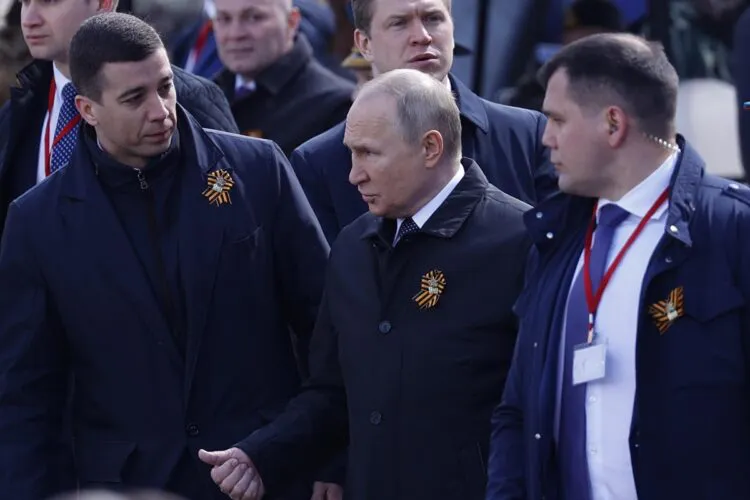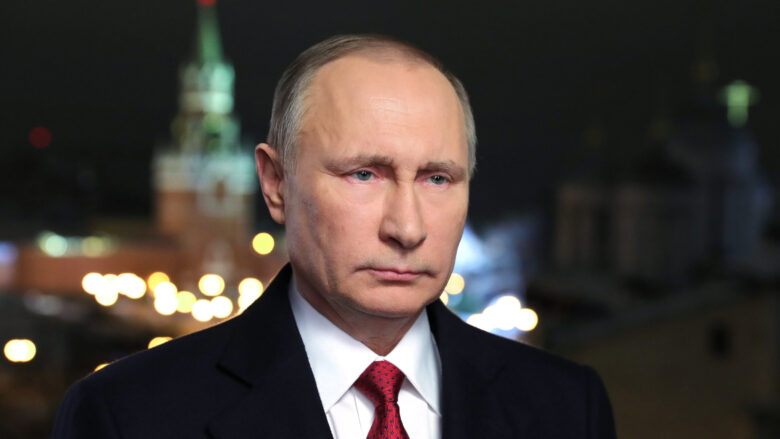What will happen to “Russia after Putin”? If Russia loses the war in Ukraine, President Vladimir Putin may slip from “the seat of power. What kind of successor will emerge next? There is no guarantee that he will not be “even worse than Putin.
An Optimistic Scenario for Post-Putin Russia

If Russia is defeated and Putin’s government falls, “the successor government will make a full apology to Ukraine and switch its course sharply to a pro-US policy.
This scenario is not impossible. Since we are in the midst of a war, one might think, “How could that awful Russia become pro-U.S.?” But in the past, after losing a war with the U.S., Japan and Germany both changed their course to a more pro-U.S. policy. If they had continued with their militarism, the current development would not have been possible.
It is not necessarily true that Russia will not make the same choice. The biggest reason is that the West will not lift economic sanctions on Russia unless the “Putin regime” is completely liquidated. If the sanctions are not lifted, Russia will be left in a state of poverty and will eventually have no choice but to become a country like “North Korea,” a country with a big figure.
On the other hand, if it relies on China to rebuild the country, China will be happy to get cheap natural gas and crude oil from Russia, but Russia will become a vassal state of China. Russia has a sense of inferiority toward the West, but toward China it thinks, “I used to be an ally of communism, and China was my henchman. Would such a Russia become China’s henchman? The question remains.
Therefore, the option of “post-war Russia turning pro-U.S.” is possible.
Possibility of Continued Dictatorship
On the other hand, there is also the “most pessimistic scenario.
Following Putin’s debacle, an even more “radical and vicious dictatorship” may be born. I specifically mentioned the names of six potential successors in my column published September 30, and they are all supporters of the dictatorship.
If any one of them comes to power, the West will see it as “version 2 of the Putin regime” and will not lift economic sanctions. Under their rule, it is highly unlikely that Russia will be able to break free from dictatorship and despotism.
At this point, no one knows which of these scenarios will become reality, or even whether the Putin regime will fall. However, pessimism, or the view that “even if Putin falls, he will be succeeded by an even worse regime,” seems to be gaining ground in the West.
An article on September 26 on the website of the Atlantic Council, a US think tank, offers a glimpse of this pessimism. The short article is titled “The West Should Not Fear a Post-Putin Russia. The author is Richard D. Hooker, a senior fellow at the Atlantic Council who has also served as a special assistant to the U.S. president. It follows
———-
[As Ukraine reclaims territory, there is a new debate. ‘A Ukrainian victory would oust Putin from power. And a post-Putin Russia will be worse.” Some predict the emergence of a Stalin-like successor, or the outbreak of civil war, or even the collapse of the Russian Federation itself.
Fear of these consequences of a Russian defeat has led to a growing consensus that Putin should not be humiliated and that the war should end with a negotiated settlement.
———-
The author is a real professional, having served as dean of the NATO Defense College and as an instructor at the U.S. Military Academy. It is credible because such a person writes, “At the highest level within NATO, there are many who say, ‘Don’t hunt Putin down. Conversely, the story is that “NATO is growing increasingly confident of victory.
Hooker disagrees with these compromising views, writing
———-
[Such a solution would give Putin some Ukrainian territory despite his defeat and setback on the battlefield. Putin loses, but he wins. In fact, a “post-Putin Russia, but worse” scenario seems unlikely. This is because whoever succeeds him will have to face a harsh reality. Economic woes will hamper the rebuilding of the Russian military. And to begin with, Russia doesn’t even have the resources to confront the West forever.
———-
———-
[Joon] Asking China, Iran, or North Korea for help won’t help his successor. Iran and North Korea are lightweights and their militaries are more than a generation behind the West. China poses a long-term threat to Russia. If it depends on China, it will end up under Chinese control.
If Putin is ousted from power, self-preservation will be paramount for Russia’s nascent conglomerates, generals, and senior bureaucrats. Only a minority would want to “return to a regime of fear and mistrust.” Just as the Communist Party Politburo ended the reign of terror after Stalin’s death, normalization and the restoration of stability are likely to be priorities after Putin.
There is a vein of “imperialism and expansionism embedded in Russia’s historical and cultural DNA. But Japan, Germany, South Korea, Spain, Portugal, and Greece have abandoned militarism and dictatorship. We should be cautious in assuming that “things will be worse after Putin.”
———-
In a nutshell, he wants to say, “Don’t cut corners in the fight” for fear that a post-Putin Russia will once again become a vicious dictatorship.
What the Two “Dictator” Candidates Have in Common
On October 17, the political media outlet Politico published an article titled “Plans for a Post-Putin World in Turmoil,” which reads as follows
———-
Few people in the West talk openly about ‘post-Putin’ for fear of being seen as “meddling in Russia’s domestic politics. In private, however, they are preoccupied with “what scenario will open the curtain” and “how the West will respond to it.”
There is one consensus. It will not be a clean transition. A former Russian ambassador to the U.K. said, “We should put aside the illusion that what happens next will be an immediate democracy as it is. Perhaps next will be the Troubles.
———-
If anything, this is pessimism. Not only from a military perspective, but also from a political and diplomatic perspective, optimism cannot be assumed.
The article goes on to point out that, “In the event of a factional conflict, all concerned are watching Ramzan Kadyrov, the head of the Chechen Republic. Kadyrov, who has his own troops in Ukraine, has been increasingly critical of Defense Minister Sergei Shoigu.
After the fall of Liman in eastern Ukraine, he said, “Yesterday Ijum, today Liman, tomorrow where? He is being matched by Evgeny Prigozhin, founder of the Wagner Group, a private military company that also dispatches mercenaries to Ukraine.
What makes Kadyrov and Prigozhin hard to ignore is the fact that they both have their own units. When it comes down to the crunch, it is their own military power that will be the decisive factor.
Looking beyond the hard-liners
Are there any strong candidates to succeed Vladimir Putin other than his cronies?
One man who has been attracting attention is Alexei Navalny, a dissident activist who is currently behind bars. Last month, Mr. Navalny posted a memoir in the Washington Post about “After Putin” from prison.
The details are unclear, but the paper notes that “the essay was carried by his lawyers. The Sept. 30 article, titled “This Is What Post-Putin Should Look Like,” states
[———-
[Western leaders] said, “Russia and Putin must not win. Ukraine should be an independent democratic state,” they say. That is correct, but only in terms of tactics. The key strategy is to “make sure that Russia never starts another war and does not find war attractive. It is a minority of Russian society that initiated the invasion.
Even if the immediate tactical task is accomplished, what guarantee is there that the world will not face a “more aggressive regime, bent on vengeance and imperialist ideals? That regime, though under economic sanctions, is always ready to mobilize, and it has nuclear weapons.
———-
———-
If Putin loses, he may say that he did not lose to Ukraine, but “to the West and NATO,” rebuild his army, and next time start a new war in a hybrid war. To avoid this, the “Russian postwar problem” will become the central issue. Without a plan that addresses the source of the problem, long-term goals cannot be achieved.
Russia’s problem is, first of all, “jealousy of Ukraine. The obsession with hating Ukraine for choosing Europe and wanting to “destroy them” is common not only among Putin but also among this generation of politicians. Next is the notion that “war is not a catastrophe, but a means of solving problems. The Russian elite has learned that “this approach has not failed” in the 23 years since the second Chechen conflict. Thus, third, it is too naïve to expect that “replacing Putin with another elite will change this view of war.”
Fourth, the good news is that the obsession with Ukraine has not spread outside of the power elite. Propaganda has a certain effect, but even so, in Moscow and other large cities, the majority of the population is critical of the war.
The real proponents of war are the entire elite and the power system that reproduces dictatorship and despotism. Historically, Russia has had many opportunities to exterminate it, but could not. The collapse of the Soviet Union was its last chance, but the West failed in favor of a “presidential republic.”
Those countries that opted for a parliamentary republic, like the Baltic states, did well and joined Europe. Ukraine, Moldova, and Georgia, which chose presidential republics, faced persistent instability and made no progress. Those countries in Russia and Central Asia that have opted for strong presidential regimes have become rigidly despotic and have repeatedly engaged in military conflicts with their neighbors.
———-
———-
[Russia needs a “parliamentary republic”. That is the only way out of endless imperialist dictatorship and despotism. It is not a panacea, but it has decisive advantages. It is the only way out of imperialist dictatorship and tyranny, but it has decisive advantages: devolution of power to the people, a government with a parliamentary majority, an independent judiciary, and greater local authority.
I do not want the West to overlook the root causes of the war. As long as the current form of the state is maintained, post-Putin Russia will become another belligerent “Putinist” state. Only a parliamentary republic can stop that.
———-
I was surprised that Navalny, who has been placed under severe detention, was so calm and consistent in his outlook. The Washington Post, which published the memoir, wrote in an October 12 editorial titled “After War, After Putin, What Comes Next for Russia?”
———-
It would be ideal if Navalny were freed and put in a leadership position to help democracy take root in Russia. But we must also be wary of the possibility that Russia will take a different path. Defeating the war may make Russia a little more docile, but that doesn’t necessarily mean it will “rejoice in freedom.”
———-
There is hope. But I am not optimistic.


コメント